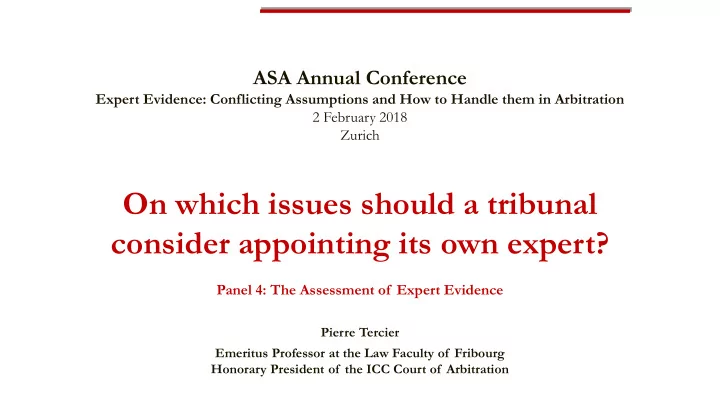

ASA Annual Conference Expert Evidence: Conflicting Assumptions and How to Handle them in Arbitration 2 February 2018 Zurich On which issues should a tribunal consider appointing its own expert? Panel 4: The Assessment of Expert Evidence Pierre Tercier Emeritus Professor at the Law Faculty of Fribourg Honorary President of the ICC Court of Arbitration
INTRODUCTION A. CERTAIN PRINCIPLES B. CERTAIN ISSUES C. CERTAIN CONSIDERATIONS CONCLUSION
INTRODUCTION 1. THE QUESTION Whether and, if so, in what cases the arbitrators may or must call upon an independent expert?
2. THE ( ONLY ) ANSWER “It depends” Legal cultures (common law, civil law and others) Significance of the case Nature of the questions Knowledge of the tribunal (in comparison to that of counsel) Requests of the parties (or their agreement to this effect) Presentations of the party-appointed experts (particularly, if radically different positions)
A. C ERTAIN PRINCIPLES 1. THE IMPORTANCE The arbitrators should be able to master all issues of the case based on their knowledge and on the presentation by counsel (note: specialised tribunals). Occasionally, one or more members of the tribunal have more special knowledge on the specific field. Arbitrators (sole arbitrator in particular) may not have such special knowledge and must have the assistance of experts. The delicate or difficult position of the arbitrators in relation to that of counsel.
1. THE IMPORTANCE ( CONT ’ D ) What is the reason behind this difficulty? Procedural specialists (lawyers) vs technical or o commercial o Modern cases are more and more complex A lawyer- arbitrator and the “full picture” o The (significant) possibility for cross- examination of such evidence
2. THE INTEREST Recourse to tribunal-appointed experts seems to be advisable for instance: When there are fundamentally different positions between the party-appointed experts or suspicion on their neutrality. Occasionally, when such evidence is necessary in the form of complementary knowledge (even in the absence of party- appointed experts). When the parties request the appointment of such experts. Swiss example: part of right to be heard (see ATF 4A_2/2007 reason 3).
2. THE INTEREST ( CONT ’ D ) Necessity Appropriateness Time Costs
B. C ERTAIN ISSUES 1. Questions of arbitral procedure 2. Questions of substantive law 3. Technical questions 4. Financial questions 5. Other evidence
1. QUESTIONS OF ARBITRAL PROCEDURE In principle, under the competence of the arbitrators (the President). Tribunal-appointed expert may assist in certain circumstances in both commercial and investment arbitrations (document production and in particular, confidentiality claims).
2. QUESTIONS OF SUBSTANTIVE LAW In principle, under the competence of the arbitrators (the one specialising in the relevant national law). Often the case in both commercial and investment arbitrations. In investment arbitration, there is an additional type of legal expert evidence: evidence on international investment law. BUT: This is the role of counsel and within the arbitrators’ competence. o o Exceptions: when there are difficult or untested questions of investment law. Why it exists? Opportunity for testing the expert evidence via cross- o examination.
3. TECHNICAL QUESTIONS Classical field. In both commercial and investment cases and on a case by case basis.
4. FINANCIAL QUESTIONS In particular, in relation to the fixing of damages in both investment and commercial arbitrations.
5. OTHER EVIDENCE For instance, the possibility for forensic evidence (i.e., on authenticity of documents)
C. C ERTAIN CONSIDERATIONS 1. ARE TRIBUNAL - APPOINTED EXPERTS USED IN ADDITION TO OR INSTEAD OF PARTY - APPOINTED EXPERTS ? It depends on what was agreed upon. In addition if fundamentally different positions between the party-appointed experts or if such experts are not neutral.
2. WHAT HAPPENS IN CASE OF CONFLICTING EVIDENCE / CONCLUSIONS OF TRIBUNAL - APPOINTED EXPERTS AND PARTY - APPOINTED EXPERTS ? Final decision is on the tribunal which will consider and will weigh the evidence and come to an independent judgment.
3. DOES THE TRIBUNAL - APPOINTED EXPERT BECOME A “ FOURTH ARBITRATOR ”? The tribunal still has the duty to decide the dispute. The tribunal cannot delegate its decision-making mandate to the tribunal-appointed expert. However, exceptionally and with the agreement of the parties, could the tribunal be assisted and how? Transparency? To take precaution, the tribunal must always afford the parties with the possibility to cross-examine the tribunal- appointed expert.
C ONCLUSION Concerns concerning tribunal-appointed experts (i.e., lack of control by the parties, limited access to information, possibility for decision-making by the expert) may still exist. Necessity for the tribunal to be assisted. The appointment of tribunal experts has become less common in ICC arbitration over recent years due to the parties’ increasing tendency to appoint their own independent experts. The Klaus Sachs model.
Recommend
More recommend